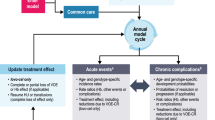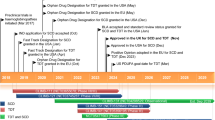Abstract
Germline mutations in RUNX1 result in rare autosomal-dominant familial platelet disorder with predisposition to acute myeloid leukemia (FPD/AML). As genetic analysis is becoming increasingly prevalent, the diagnosis rate of FPD/AML is expected to increase. In this report, we present two pedigrees, one diagnosed molecularly and another highly suspected to be FPD/AML, whose members both received allogeneic hematopoietic stem cell transplantation (HSCT). Both pedigrees had a family history of thrombocytopenia, platelet dysfunction, and hematological malignancies. One family inherited a frameshift mutation (p.P240fs) of RUNX1, a known pathogenic variant. Another family inherited a point mutation (p.G168R) in the runt-homology domain, the clinical significance of which is uncertain at this point. As this mutation was completely absent from all population databases and had a relatively high REVEL score of 0.947, we thought that it would be dangerous to ignore its possible pathogenicity. Consequently, we avoided choosing HSCT donors from relatives of both families and performed HSCT from unrelated donors. In conclusion, our experience with two families of FPD/AML highlights the importance of searching for gene mutations associated with germline predisposition and indicates the necessity of developing a donor coordination system for FPD/AML patients, as well as a support system for families.

Similar content being viewed by others
Data availability
The data that support the findings of this study are available on request from the corresponding author.
References
Vradii D, Zaidi SK, Lian JB, van Wijnen AJ, Stein JL, Stein GS. Point mutation in AML1 disrupts subnuclear targeting, prevents myeloid differentiation, and effects a transformation-like phenotype. Proc Natl Acad Sci USA. 2005;102:7174–9.
Brown AL, Arts P, Carmichchael CL, Babic M, Dobbins J, Chong CE, et al. RUNX1-mutated families show phenotype heterogeneity and a somatic mutation profile unique to germline predisposed AML. Blood Adv. 2020;4:1131–44.
Luo X, Feurstein S, Mohan S, Porter CC, Jackson SA, Keel S, et al. ClinGen myeloid malignancy variant curation expert panel recommendations for germline RUNX1 variants. Blood Adv. 2019;3:2962–79.
Richards S, Aziz N, Bale S, Bick D, Das S, Gastier-Foster J, et al. Standards and guidelines for the interpretation of sequence variants: a joint consensus recommendation of the American College of Medical Genetics and Genomics and the Association for Molecular Pathology. Genet Med. 2015;17:405–24.
Ioannidis NM, Rothstein JH, Pejaver V, Middha S, McDonnell SK, Baheti S, et al. REVEL: an ensemble method for predicting the pathogenicity of rare missense variants. Am J Hum Genet. 2016;99:877–85.
Kanagal-Shamanna R, Loghavi S, DiNardo CD, Medeiros LJ, Garcia-Manero G, Jabbour E, et al. Bone marrow pathologic abnormalities in familial platelet disorder with propensity for myeloid malignancy and germline RUNX1 mutation. Haematologica. 2017;102:1661–70.
DiNardo CD, Bannon SA, Routbort M, Franklin A, Mork M, Armanios M, et al. Evaluation of patients and families with concern for predispositions to hematologic malignancies within the hereditary hematologic malignancy clinic (HHMC). Clin Lymphoma Myeloma Leuk. 2016;16:417-428.e2.
Osato M, Asou N, Abdalla E, Hoshino K, Yamasaki H, Okubo T, et al. Biallelic and heterozygous point mutations in the runt domain of the AML1/PEBP2αB gene associated with myeloblastic leukemias. Blood. 1999;93:1817–24.
Deltcheva E, Nimmo R. RUNX transcription factors at the interface of stem cells and cancer. Biochem J. 2017;474:1755–68.
Michaud J, Wu F, Osato M, Cottles GM, Yanagida M, Asou N, et al. In vitro analyses of known and novel RUNX1/AML1 mutations in dominant familial platelet disorder with predisposition to acute myelogenous leukemia: implications for mechanisms of pathogenesis. Blood. 2002;99:1364–72.
Simon L, Spinella JF, Yao CY, Lavallee VP, Boivin I, Boucher G, et al. High frequency of germline RUNX1 mutations in patients with RUNX1-mutated AML. Blood. 2020;135:1882–6.
Ciurea SO. Considerations for haploidentical versus unrelated donor transplants. Bone Marrow Transplant. 2019;54:738–42.
Zhang J, Walsh MF, Wu G, Edmonson MN, Gruber TA, Easton J, et al. Germline mutations in predisposition genes in pediatric cancer. N Engl J Med. 2015;373:2336–46.
Berger G, van den Berg E, Sikkema-Raddatz B, Abbott KM, Sinke RJ, Bungener LB, et al. Re-emergence of acute myeloid leukemia in donor cells following allogeneic transplantation in a family with a germline DDX41 mutation. Leukemia. 2017;31:520–2.
Kobayashi S, Kobayashi A, Osawa Y, Nagao S, Takano K, Okada Y, et al. Donor cell leukemia arising from preleukemic clones with a novel germline DDX41 mutation after allogenic hematopoietic stem cell transplantation. Leukemia. 2017;31:1020–2.
Acknowledgements
The authors would like to thank the patients, their families, and all the medical staff members involved in treating these patients. This work was supported by the Department of Pathology and Tumor Biology at Kyoto University. This work was supported by the Japan Agency for Medical Research and Development (AMED) (JP19cm0106501h0004, JP19ck0106250h0003 to S.Ogawa.; JP19ck0106353h0003 to Y.N.), the Japan Society for the Promotion of Science (JSPS); Scientific Research on Innovative Areas (JP15H05909 to S.Ogawa) and KAKENHI (JP26221308 and JP19H05656 to S.Ogawa.; JP18H02836 to Y.N.).
Author information
Authors and Affiliations
Corresponding author
Ethics declarations
Conflict of interest
The authors declare no conflict of interest.
Additional information
Publisher's Note
Springer Nature remains neutral with regard to jurisdictional claims in published maps and institutional affiliations.
About this article
Cite this article
Toratani, K., Watanabe, M., Kanda, J. et al. Unrelated hematopoietic stem cell transplantation for familial platelet disorder/acute myeloid leukemia with germline RUNX1 mutations. Int J Hematol 118, 400–405 (2023). https://doi.org/10.1007/s12185-023-03575-1
Received:
Revised:
Accepted:
Published:
Issue Date:
DOI: https://doi.org/10.1007/s12185-023-03575-1




